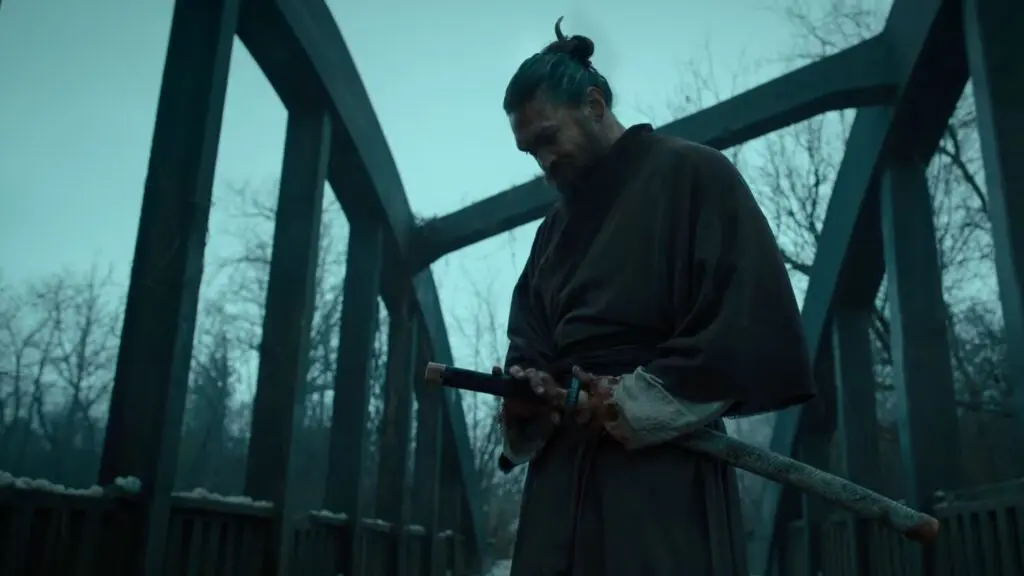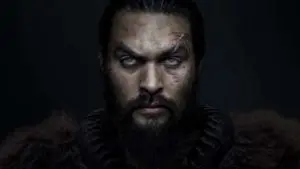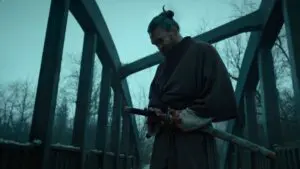Summary
“The Compass” fittingly sends the show in a new direction, as the world continues to broaden and develop.
This recap of See season 2, episode 3, “The Compass”, contains spoilers.
For the first time in “The Compass”, we see some real weakness in Edo Voss. He’s still stinging from a major defeat. His brother, Baba, has escaped along with the Witchfinder General and Haniwa, all of which could have been avoided had he just put his petty grievances aside and killed them, rather than keeping them around for prolonged torture sessions. What’s more, is that the escape could have only been facilitated by a traitor in the Trivantian ranks. For now, the Council wants him focused on the true threats to the republic, which they perceive to be the Ganites, but you just know Edo isn’t going to let this go.
See season 2, episode 3 recap
The bulk of this episode, though, involves Baba Voss and his children, who’re still separated, and the political maneuvering at Pennsa, where Harlan learns from a surviving witness that Queen Kane is the only one who could have destroyed Kanzua. Proving his bona fides, Harlan kills the man and hacks out his tongue, which he presents to the queen. The implication is clear. Kane tells Maghra the good news — that Kofun has been found — and then counters it with two lots of bad news. One, she has lost her potentially sighted baby, which is a predicament, since if anyone discovers the Queen is no longer with child, then sighted children won’t have any of the protections she has promised them. In other words, Kofun and Haniwa won’t be safe. They need to keep the people on-side, and since Harlan has so much influence, the only way to do that is for Maghra to marry him. More survivors of Kanzua are sure to spread the word of what happened there, and Harlan is the only way to quell the potential uprising.
Meanwhile, Baba, Tamacti Jun, and Haniwa wander right into a slaver’s den, where it all kicks off. The men, still exhausted and starving from their ordeal in Edo’s prison, are quickly overwhelmed, but the group is saved in the nick of time by a gang of women with rope-blades who’re accompanying Paris. This is the titular Compass, a secret society of women warriors descended to protect the sighted when vision inevitably returns, and they’re not entirely keen on traveling with the Witchfinder General, though Baba insists they do. As it also turns out, Paris used to be a member of this sect but left its ranks in a state of some disgrace. The queen’s inclusive decree has spread this far already, but as Paris says, “Bigotry cannot be changed by decree.” The possibility must be considered that Queen Kane is making more of a target of the sighted by drawing attention to them. Her endgame, beyond power, remains nebulous.
Maghra’s, though, is a little more clear-cut. In-between training with perhaps the most ridiculous weapon I’ve ever seen, she agrees to get hitched to Harlan in exchange for some favors and the protection of her family. She’s playing a smart game, planning to announce the engagement but hold off the wedding indefinitely, but later, Queen Kane announces the betrothal and sets a date. Was Harlan involved in that little betrayal? He insists not, but you know how he is.
“The Compass”, which is a slower episode by comparison to the first two, is a good opportunity for some necessary explanatory dialogue, as well as the chance to solidify some of the show’s themes. Paris tells Haniwa about her time in the Compass, as a guardian assigned to protect a young sighted boy. She broke the rules by showing him the artifacts and books they had and teaching him to read. But the boy’s hunger for knowledge couldn’t be satisfied. When she woke up one day, he was gone, along with the books and the knotted codes that teach reading. Of course, he was Jerlamarel. Tearfully, Paris explains how humans always ostracise those they perceive to be different — this, ironically, is one of the main ways in which we’re all the same.
Kofun, meanwhile, is being escorted back to Pennsa by three Witchfinders, the leader of whom may or may not be called Toad (I’m pretty sure that’s what he was referred to as, but I can’t be bothered to pull up the press notes and the screener didn’t have closed captions. Correct me if I’m wrong.) There is division among the Witchfinder ranks. Toad is all about following orders, but the other two think not killing a sighted person — a witch, in other words — is tantamount to heresy. In the night, they attempt to kill Kofun, and Toad is forced to intervene, killing one and letting the other flee. There’s clearly a bond forming between these two, and it should be interesting to see how it develops.
“The Compass” ending explained
Baba provides us with a bit of context on Edo. He tells Haniwa that his father ordered Baba to kill him, but he made the choice not to (absolving him in our eyes, obviously, though I like the idea of him as a real anti-hero). See, their mother died giving birth to Edo, and their father never forgave the younger brother for it. Edo was too young to question his father’s point of view. This cracks a bit of a window into Edo’s psyche, but he still can’t help but take his villainy to the next level. He tells Wren to send word to all of the Trivantian outposts that he wants Baba and Haniwa brought to him alive. He intimates that he knows who the traitor is, sending a shiver up Wren’s spine. And, lastly, he visits Jerlamarel, who is adamant about keeping his blindness a secret so that Edo doesn’t know he’s compromised. No such luck, though. Realizing that Jerlamarel has lost his power, Edo beheads him in front of his son, takes over the House of Enlightenment, and installs one of his own men, a scientist, there to keep an eye on things. Not literally, obviously. But you get the idea. Edo with access to all of that knowledge certainly seems like a cliffhanger to me.




